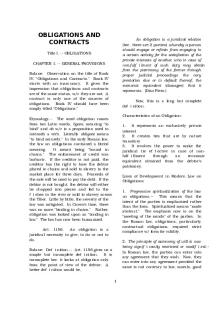Obligations and Contracts Article 1222-1240 PDF

| Title | Obligations and Contracts Article 1222-1240 |
|---|---|
| Course | Accontancy |
| Institution | Tarlac State University |
| Pages | 2 |
| File Size | 93.3 KB |
| File Type | |
| Total Downloads | 108 |
| Total Views | 133 |
Summary
Give explanations as to what the given articles mean in simple and understandable words....
Description
Article 1222. A solidary debtor may, in actions filed by the creditor, avail himself of all defenses which are derived from the nature of the obligation and of those which are personal to him, or pertain to his own share. With respect to those which personally belong to the others, he may avail himself thereof only as regards that part for which the latter are responsible. Ang nagkautang ay, na sinampahan ng nagpautang, makakakuha ng lahat na mga depensa na mula sa obligasyon at mga personal sa kanya, o ang kanyang mga sariling hati. Sa mga bagay na pagmamay-ari ng ibang nagkautang, makakakuha ang nagkautang ng depensa sa mga bahagi lamang na may responsibilidad siya.
Kinds of Defenses 1. Those derived from the nature of obligation (complete defense) Example: Allen and Ben are solidarily liable to Cen in the amount of P20,000.00 The entire debt of Allen and Ben was paid by Dan. In an action by Cen against Allen, the latter can raise the defense of payment by virtue of which the obligation was extinguished. Allen’s defense derived from the nature of the obligation is a complete defense because it nullifies the obligation or renders it ineffective. Other examples are fraud, prescription, remission, illegality or absence of consideration, res judicata, non-performance of a suspensive obligation. •
Defenses personal to, or which pertain to share of, debtor sued. A solidary debtor, by his own act or inaction, such as by failing to appeal, may lose the benefit of Article 22.
Examples: b.1. If the action by Cen is against Ben, and Ben was insane at the time the obligation was contracted, Ben can put up the defense of insanity with respect to the entire obligation. This defense is personal to Ben alone. It is a complete defense. b.2. Other examples: Incapacity, Fraud, Mistake, Violence, Minority, etc. b.3. Assume that the portion of the obligation affecting Ben is subject to a suspensive condition which has not yet happened. In this case, the non-fulfillment of the condition is a partial defense as it can be set up by Ben only with respect to his share. Cen can demand from Ben the portion of the obligation pertaining to Allen because Ben is solidarily liable. C. Defenses personal to other solidary debtors Example: In the two preceding examples, the defense of insanity or non-fulfillment of suspensive condition is not available to Allen as to release him from his liability for his share in the obligation. Allen may avail himself thereof only as regards that part of the debt for which Ben is liable. Hence, having only a partial defense, Allen is still liable for P4,000.00, his share in the obligation. Article 1231. Obligations are extinguished: 1. By payment or performance; 2. By the loss of the thing due; 3. By the condonation or remission of the debt; 4. By the confusion or merger of the rights of creditor and debtor; 5. By compensation; 6. By novation. Other cause of extinguishment of obligations are annulment, rescission, fulfilment of a resolutory condition, and prescription, are governed elsewhere in this Code. Article 1240. Payment shall be made to the person in whose favour the obligation has been constituted, or his successor in interest, or any person authorized to receive it. Ang pagbayad ay ginagawa sa tao na pinapaboran ng nagawang obligasyon, o ang kanyang tagapagmana sa tubo, o
sinumang tao na may karapatang tumanggap nito.
Person to whom payment shall be made to: 1. The creditor or obligee (person in whose favour the obligation has been constituted);...
Similar Free PDFs

Obligations and Contracts
- 40 Pages

Obligations and Contracts Reviewer
- 55 Pages

OBLIGATIONS AND CONTRACTS reviewer
- 35 Pages

Obligations and contracts pdf
- 101 Pages

Obligations and Contracts Reviewer
- 28 Pages

Obligations and Contracts Reviewer
- 15 Pages

LAW ON OBLIGATIONS AND CONTRACTS
- 7 Pages
Popular Institutions
- Tinajero National High School - Annex
- Politeknik Caltex Riau
- Yokohama City University
- SGT University
- University of Al-Qadisiyah
- Divine Word College of Vigan
- Techniek College Rotterdam
- Universidade de Santiago
- Universiti Teknologi MARA Cawangan Johor Kampus Pasir Gudang
- Poltekkes Kemenkes Yogyakarta
- Baguio City National High School
- Colegio san marcos
- preparatoria uno
- Centro de Bachillerato Tecnológico Industrial y de Servicios No. 107
- Dalian Maritime University
- Quang Trung Secondary School
- Colegio Tecnológico en Informática
- Corporación Regional de Educación Superior
- Grupo CEDVA
- Dar Al Uloom University
- Centro de Estudios Preuniversitarios de la Universidad Nacional de Ingeniería
- 上智大学
- Aakash International School, Nuna Majara
- San Felipe Neri Catholic School
- Kang Chiao International School - New Taipei City
- Misamis Occidental National High School
- Institución Educativa Escuela Normal Juan Ladrilleros
- Kolehiyo ng Pantukan
- Batanes State College
- Instituto Continental
- Sekolah Menengah Kejuruan Kesehatan Kaltara (Tarakan)
- Colegio de La Inmaculada Concepcion - Cebu








